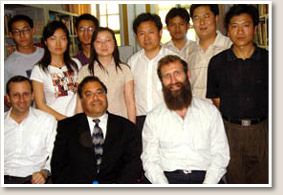Mandarian in the mikve: Return of Chinese Jews
Miracles happen everyday!
Excerpts of article by Michael Freund on jpost.com
 Last week, the small and unassuming mikve (ritual bath) in Hod HaSharon witnessed the unfolding of a remarkable scene in the annals of Jewish history.
Last week, the small and unassuming mikve (ritual bath) in Hod HaSharon witnessed the unfolding of a remarkable scene in the annals of Jewish history.
One by one, six young Chinese men, all descendants of the Jewish community of Kaifeng, China, immersed themselves in the warm and purifying waters before a three-man rabbinical court, thereby completing their long journey home to the Jewish people.
It marked the first time that a group of Chinese-Jewish men had undergone a formal return to Judaism in the Jewish state.
And for Yaakov Wang, as well as the others, it was the fulfillment of a life-long dream, one that had been passed down to them by their ancestors throughout the generations.
As a young man in China, Wang first learned of his family’s Jewish heritage from his grandfather. And while he knew little about the details of Jewish practice, he instilled within Wang a strong sense of Jewish pride.
Hence, whenever Wang went out for dinner with his friends, he refrained from eating pork, despite the central role it plays in Chinese cuisine.
And when he told his fellow students in school that he was Jewish, many responded by saying to him, “now I know why you are cleverer than me.” As Wang grew older, and began to delve more deeply into Kaifeng’s Jewish past, he learned that it was a community with a long and rich heritage, much of it unfamiliar to most of world Jewry.
SCHOLARS BELIEVE that Jews first settled in Kaifeng, which was one of China’s imperial capitals, in the 8th century during the Song Dynasty, or perhaps even earlier.
They were Sephardic-Jewish merchants from Persia or Iraq who made their way eastward along the Silk Route and settled in Kaifeng with the blessing of the Chinese emperor.
The Jews quickly established themselves in the city, where they found an environment of tolerance and acceptance, in sharp contrast to much of the rest of the Diaspora.
In 1163, Kaifeng’s Jews built a large and beautiful synagogue, which was subsequently renovated and rebuilt on numerous occasions throughout the centuries.
At its peak, during the Ming Dynasty (1368- 1644), the Kaifeng Jewish community may have numbered as many as 5,000 people.
By the 17th century, a number of Chinese Jews had attained high ranks in the Chinese civil service, but along with success came the blight of assimilation, which took an increasingly heavy toll on the community and its cohesion.
As a result, by the mid-1800s, the Chinese Jews’ knowledge and practice of Judaism had largely faded away. The last rabbi of the community is believed to have died in the early part of the 19th century, and the synagogue-building was all but destroyed by a series of floods which struck the city in the 1840s and thereafter.
Nevertheless, against all odds, Kaifeng’s Jews struggled to preserve their Jewish identity, passing down whatever little they knew to their progeny.
Click here for the full article.

